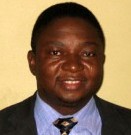 Dr. Sunday Adeoye first encountered the problem of obstetric fistula as a medical resident. Moved by the stories of the fistula clients he met, Dr. Sunday sought out training in fistula repair surgery with preeminent surgeons already working in Nigeria. Following that experience Dr. Sunday was invited to manage the recently opened fistula repair unit at the Ebonyi Teaching Hospital in Abakaliki, Nigeria. The Fistula Care Project has recently expanded its efforts to Ebonyi State, where it will support Dr. Sunday and his team to provide surgical repair to fistula survivors.
Dr. Sunday Adeoye first encountered the problem of obstetric fistula as a medical resident. Moved by the stories of the fistula clients he met, Dr. Sunday sought out training in fistula repair surgery with preeminent surgeons already working in Nigeria. Following that experience Dr. Sunday was invited to manage the recently opened fistula repair unit at the Ebonyi Teaching Hospital in Abakaliki, Nigeria. The Fistula Care Project has recently expanded its efforts to Ebonyi State, where it will support Dr. Sunday and his team to provide surgical repair to fistula survivors.
Dr. Sunday sets aside one day a week to focus on fistula repair, and he typically sees anywhere from two to twenty fistula cases in a day. Women come from all over the state and beyond to seek fistula repair services. In addition to his duties repairing fistula, Dr. Sunday also delivers babies, performs cesarean sections, teaches, and manages the Teaching Hospital’s obstetrics and gynecology department.
Ensuring that treatment for fistula is available is not enough. Dr. Sunday emphasizes that practical steps are needed to reduce maternal mortality and morbidity rates, and he is pleased to serve on a state-wide team to address fistula prevention. Last year Ebonyi State adopted a law designed to reduce delays in seeking and receiving maternal health care. Dr. Sunday is hopeful about the law’s holistic approach, which includes the free provision of antenatal care and delivery services and stipulates that women must not labor longer than ten hours without being referred and transported to a facility that can provide emergency obstetric services. Dr. Sunday and his team hope to engage the transport union to help address the challenges in transportation for laboring women. Dr. Sunday looks forward to carrying out assessments before and after the new law’s implementation in order to measure results.
It is the fistula clients themselves who motivate Dr. Sunday to keep up his hard work. He has heard so many compelling stories, ranging from clients who have experienced rejection from family members to those who are in their sixties and have lived with fistula for decades. He says that the thanks he receives from women cannot be measured in money: “The way they hug you, hold you… Even if they cannot speak your language they say ‘thank you’. It is hard to describe the joy in their faces. I have been given an opportunity to make a difference in someone’s life. Women can have their dignity restored.”


